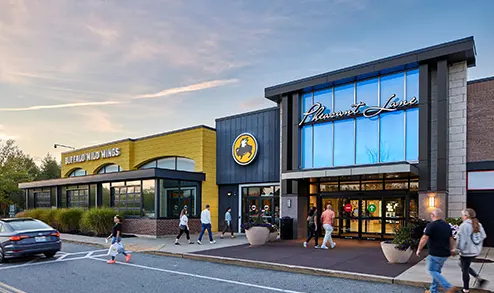 Nashua planners are to consider a proposed casino at Pheasant Lane Mall, which represents a potential transformation for the area. ECL Entertainment, in collaboration with Toronto-based private equity firm Clairvest, aims to transform a former Sears store into a 130,000-square-foot charitable gaming facility. The charitable gaming facility, slated to open by late 2024, will use the licenses that ECL obtained from its acquisition of The Lucky Moose Casino & Tavern and The River Casino & Sports Bar, also located in Nashua.
Nashua planners are to consider a proposed casino at Pheasant Lane Mall, which represents a potential transformation for the area. ECL Entertainment, in collaboration with Toronto-based private equity firm Clairvest, aims to transform a former Sears store into a 130,000-square-foot charitable gaming facility. The charitable gaming facility, slated to open by late 2024, will use the licenses that ECL obtained from its acquisition of The Lucky Moose Casino & Tavern and The River Casino & Sports Bar, also located in Nashua.
ECL is known for operating several historical horse racing (HHR) facilities in Kentucky, such as the Mint Casino at Kentucky Downs. More information about the upcoming charitable gaming facility will be revealed during ECL’s presentation at Nashua City Hall on Sept. 7.
The growth of the casino industry in New Hampshire is based on a unique charitable gaming model enacted in 2006, under which operators fund charities. Charitable organizations registered as 501(c)(3) entities can host limited casino events and earn a share of gaming revenue. Additionally, 10% of this revenue supports public education through the New Hampshire Lottery.
In 2021, the gambling industry experienced another boost after the Legislature passed a law authorizing historical horse racing (HHR) machines. New Hampshire is the first Northeastern state and the sixth nationwide to regulate HHR machines, after Kansas, Kentucky, Louisiana, Virginia, and Wyoming.
The way charitable organizations receive their share of the gaming revenue differs between HHR machines and traditional table games. When it comes to HHR, operators retain 75% of the revenue, while 8.75% is allocated to charity, and 16.25% to public education.
HHR machines look like slot machines but use different technology. Instead of utilizing a random number generator, HHR machines draw race outcomes from a vast database of previous races. According to some industry experts, these machines are designed to bypass the legal definition of slot machines.
The Casino Project Evokes Mixed Feelings among Locals
Preliminary plans for the new casino reveal that the venue will include two levels of poker and casino rooms, golf simulators, a two-story sports entertainment hub, and a bar. The sketches indicate that the company will leave some space for the addition of 300 more slot machines in the future. Marc Falcone, ELC Entertainment’s managing partner, revealed that the company is investing nearly $250 million into the city of Nashua. The ambitious project includes the transformation of the former Sears location, as well as substantial infrastructure improvements.
The proposed casino is to create around 700 new jobs and pump approximately $22 million annually into the state’s economy. Falcone revealed that there will be a lot of managerial opportunities. If the casino secures approval, it will become New England’s first gambling venue based in a shopping mall.
The casino initiative also coincides with the revitalization of shopping malls, prompted by evolving consumer preferences and the rise of e-commerce. Beyond traditional retail, malls aim to diversify their offerings by incorporating housing, entertainment, and recreational offerings to reinvigorate foot traffic.
However, concerns have been raised regarding the potential social impacts of gambling. Opponents of the project emphasize that the slot-like machines could lead to gambling disorders and financial struggles. Organizations like the New Hampshire Council on Problem Gambling highlight the importance of resources for those struggling with gambling-related problems.
On the other hand, charitable gambling venues support good causes. According to the New Hampshire Lottery, the 14 charitable casinos in New Hampshire donated over $17 million in 2022 alone. Figures show that charitable organizations raised $23.3 million to date. The mall-based casino is projected to generate nearly $24 million each year for charitable purposes by 2025. Now, the decision is in the hands of Nashua planners, who have to carefully consider the advantages and disadvantages associated with the proposed mall-based casino.